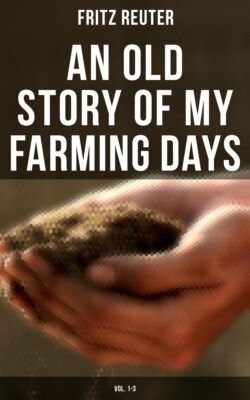Читать книгу An Old Story of My Farming Days (Vol. 1-3) - Fritz Reuter - Страница 5
На сайте Литреса книга снята с продажи.
ОглавлениеWell, well, it was not always so.--The father of the man who now rides to town with white reins for his horse, and who drinks his couple of bottles of champagne, had probably nothing better than small beer with which to quench his thirst, and had his reins tied together with his wife's garter. Ah, those were hard times in Mecklenburg when wheat was sold in barrels on the public road for sixteen pence a bushel, good measure too, to the labourers to feed their pigs with, and when, as in Rostock, a whole load of oats was given in exchange for a loaf of sugar.
Mecklenburg is a beautiful and a rich land, just the kind of country that delights a farmer, but at the time of which I am speaking there was great poverty and distress throughout the length and breadth of it, and the collector knocked at every door, and demanded that the rent should be paid, and whoever had anything to give, gave his last penny, and he who had nothing to give was sold up.
Let no one imagine from this that our country-people hobbled about the land like scare-crows during these hard times, or that one could read the "Vater-unser" through their sunken cheeks--Nay!--they were as true Mecklenburgers every bit then as now, only they had to manage differently. Now-a-days one says: "Butter costs a shilling a pound, which comes to so much a hundredweight, and if I sell so many hundredweights of it, I shall be able to buy a glass-coach and four horses to match from the sale of butter alone."--At that time one said: "What mother? Butter cost two-pence? Then let's eat it by itself.--What mother? The butcher offers fifteen shillings for the fat pig? Cut its throat, mother, and put it in our own salting-tub."--The country-people were all quite as strong and healthy then as now, and were quite as well off as regarded food in the third decade of this century as at the present day, it was the shoemakers' and tailors' bills that were the difficulty, and as for ready money, they learnt what that really was when they were called upon to pay their rent.
Yes, things are much improved of late years, and although the priests say a thousand times that the world is worse than it was, I maintain that it has grown better.
"Good morning, Mr. bailiff Wilbrandt!"--"Good morning, old friend, come and have some breakfast"--"Good morning, father Hellwig!"--"Don't bother me, I'm in a bad humour."--"Why, what's the matter?"--"A great deal's the matter. My rent has almost doubled itself, and Zirzow has done its part this year, and so here I am with £3000 that I don't know how to invest. The Rostock bank won't take in any more money, so what's to be done? Ah, Wilbrandt, it's a bad world!"--"Yes, it's a bad world," replied the bailiff; and I also said: "Very bad," without for a moment remembering the large sum of money I shall have to invest next term.--"Yes," continued Wilbrandt, "who the devil thought of mortgages in the old days?"--"True," said father Hellwig, "nobody thought of such things then. Look you, when I went to old Solomon in Stemhagen1, and told him I wanted to borrow some money from him, he said to me: 'Hellwig,' he said, 'you have an honest face, it is marked with small-pox--but there's no harm in that--you shall have the money.' And then I had to spend one night in his house, and sleep in the same room as he did. Now I have a bad habit of smoking myself to sleep, and so I always take a freshly lit pipe to bed with me, and as Solomon was very nervous about fire, he kept continually calling to me: 'Hellwig, are you still smoking?' Ah, those were good old times!"--"Yes," said the bailiff, "and how we used to rejoice when we had paid off the last farthing of our small debts! The happiest part of my life passed away with my last debts. Those were good old times."--"No," said I, "they were bad old times. You managed to keep afloat in spite of hardships and difficulties, and therefore you are worthy of all honour and respect, but many other honest men couldn't do so, try as they might."--Then Mr. X Y Z, a land-owner in the neighbourhood, came up, and striking the table so hard with his walking-stick that all the bottles danced, said: "Those who didn't get the better of their difficulties weren't worth their salt."--"What," cried the bailiff, "have you got to say to that?"--Then father Hellwig rose, and looking at him with his honest old face, said: "You are a young man, and have inherited your estate from your ancestors. You hav'n't the faintest idea of the misery of those times.--You know all about it, old friend," he added, turning to me, "so tell us about what happened then."--"Yes," I answered, "I will tell the story of those old days."
